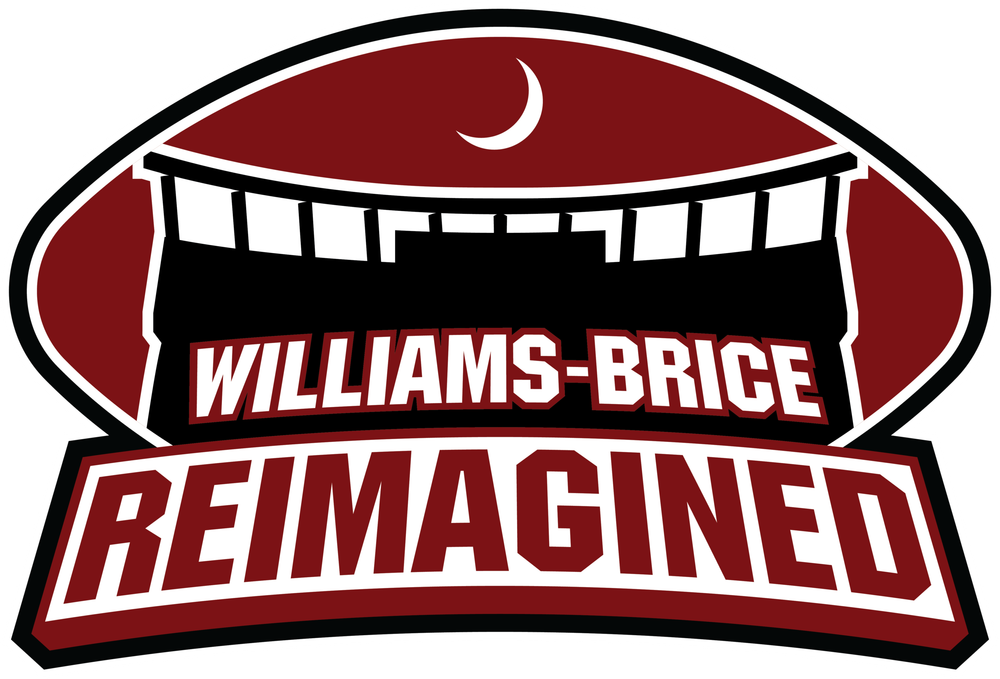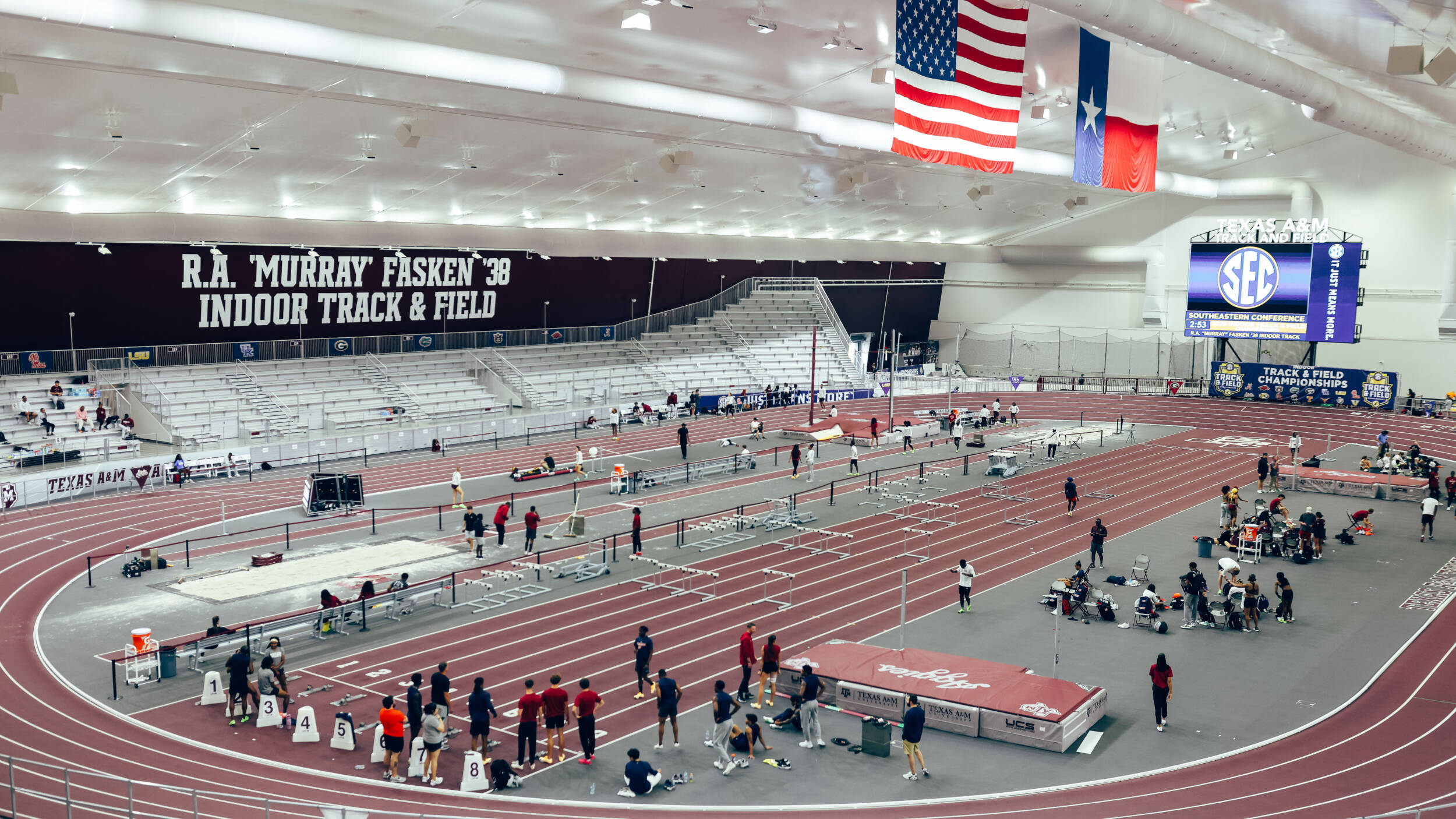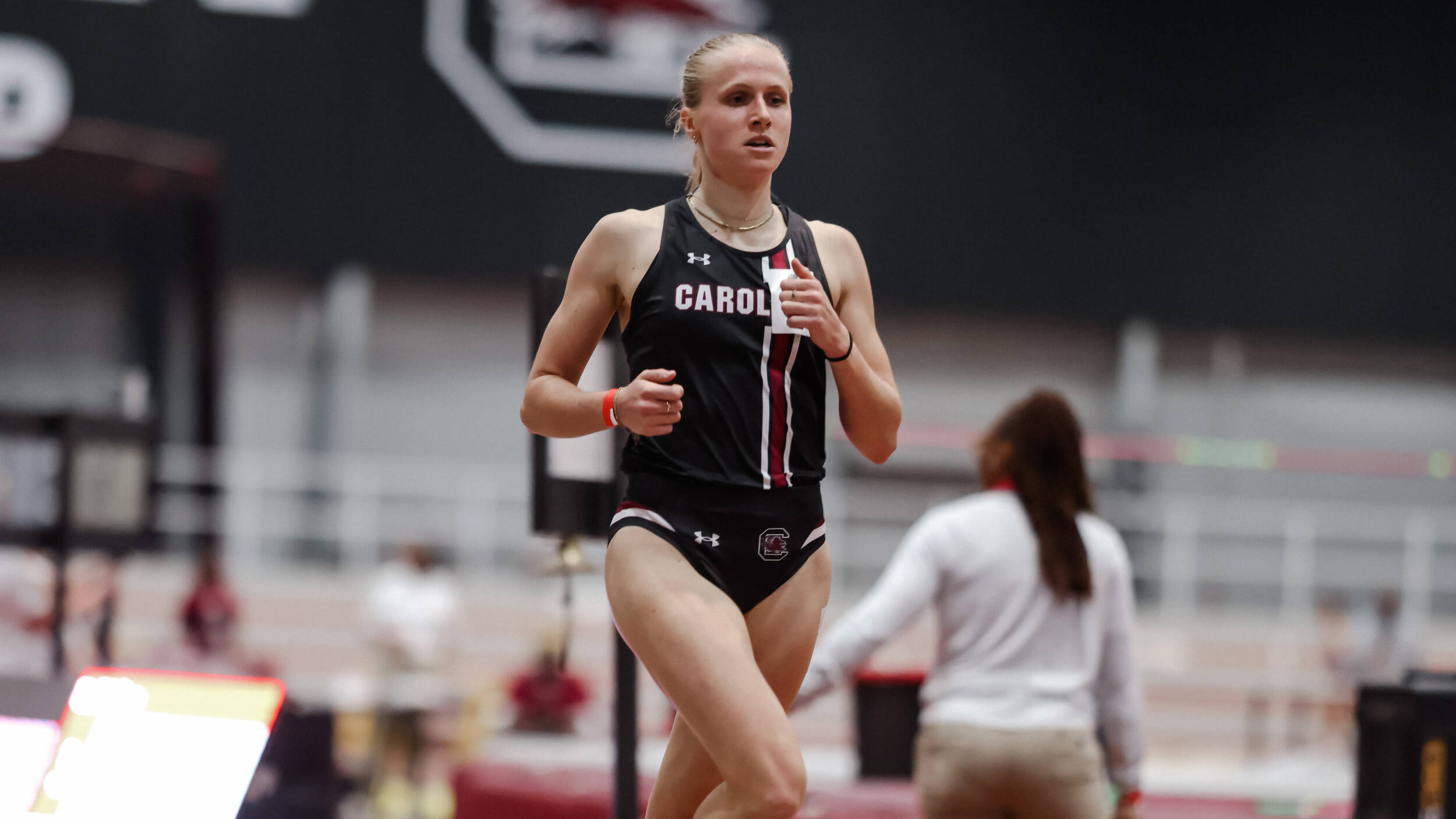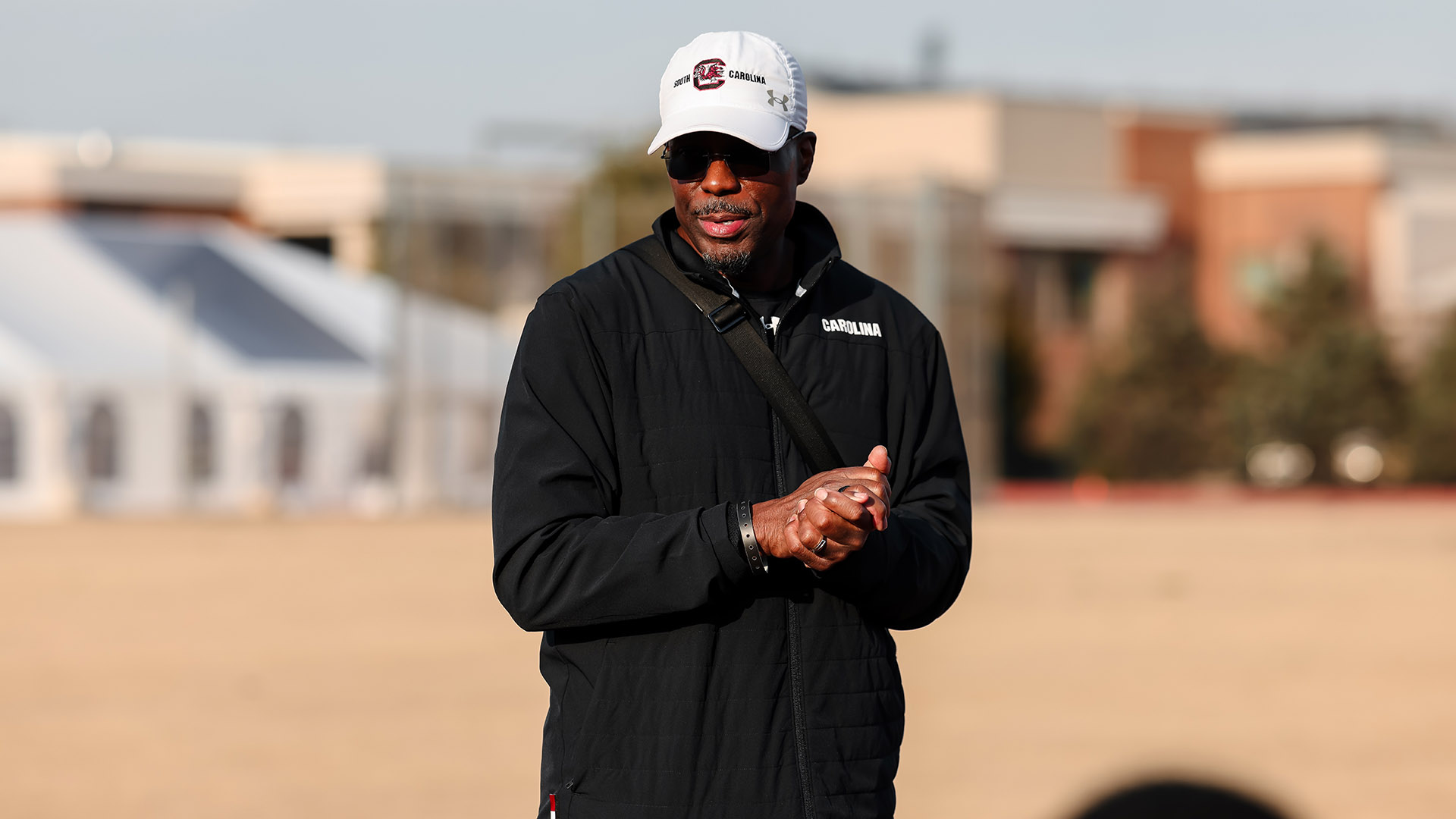May 29, 2008
Columbia, SC – Former South Carolina track and field head coach Bill McClure passed away Sat., May 25 at his home in Baton Rouge, La. after a valiant battle with cancer. He was 86. Coaching at South Carolina from 1972 to 1976, he led the Gamecocks to a third-place finish at the 1974 NCAA Indoor Championship and he was voted NCAA Region III Coach of the Year.
Five children survive him: Mike, Terry, Mitch, Karen and Tim.
Funeral services were held in Baton Rouge on Tues., May 27 and an Abilene Service was held at Elmwood Memorial Park and Cemetery today, Thurs., May 29. In lieu of flowers, please honor him with a donation in his name to the LSU, South Carolina, Abilene Christian or Samford Track and Field programs. If you would like to donate to Samford University, please designate your donation to the Mrs. Coach Scholarship Fund.
“Please say a prayer of blessing and thanksgiving for our dear one. We are all unique in this world and it is only right that not one of us can be replaced,” said his older daughter Terry. “His immediate family, brother, Jay, and sister, Marianne, his wife’s sisters, Ruth and Ruby, are especially heavy-hearted, though we know he is only beginning his journey home.”
“I think the overriding thing I will always remember was that he was a great coach, but he was a better person. He went well beyond what a typical coach would do for his athletes and he had a tremendous influence outside of athletics on all of us. There are two individuals who had the greatest influence on my life – my father and Coach McClure and I don’t know which one had more of an influence. He made us better as athletes and made us better people,” said Jim Schaper, the 1974 880 NCAA indoor runner-up and member of the two-mile relay NCAA champions. “Coach McClure was a little guy and a man of few words, but there was never a question of who was in charge. There is one story that sticks out in my mind. It was during the NCAA Championships held in Detroit in 1974 when Mike Sheley, the Brown brothers and I won the 2 mile relay. I had come back from Russia the week before and I had run three races the day before. I ran the anchor leg of the 2 mile relay. Coach McClure was also working as an official at the meet. The guys gave me a couple steps lead as the anchor, but I was so tired in the last turn – my legs were burning from all the races the day before. There was only 60 yards left and Coach McClure said `Jim, you are going to have to hurry’. I look back now and laugh, but it wasn’t funny at the time. I went back later and asked him if that was his profound encouragement. He was a great man.”
“When I got the email about his passing, I got a lump in my throat. Coach McClure meant so much to me,” said Sam Foster, a two-time captain of Gamecock track and field teams in the 1970s and current member of the USC Board of Trustees. “As a high school senior who was being recruited by a number of schools, Coach McClure wanted me to come Carolina, but he wanted to see me perform first. He asked me to walk-on and prove myself. He impressed me so much I thought it was worth it. He had a great sprit, he didn’t yell a lot, he believed in his guys and he was a fierce competitor. Coach McClure’s mentoring helped me get a head start on my career – it was the beginning of many great things. Working as a page at the state house while I was an athlete at Carolina, I made contacts and developed relationships that ultimately helped me get elected to the Board of Trustees. If I hadn’t crossed paths with Coach McClure, I might not have had those things happen.”
“I remember coming to Columbia as a young coach at East Carolina and watching him coach. He was a cowboy who loved track and field,” said Gamecock head coach Curtis Frye. “He had an outstanding team in the ACC at that time and I looked up to him as I formulated my values about track and field. We are who we are today at South Carolina today in track and field because of his early contributions to the program.”
“I was thinking about him the other day and I think he was both a coach and a father-figure to me. The discipline and work ethic he passed onto me made me a great deal of who I am now. He was much more than a coach. He touched many lives in many ways and not just in track and field,” said Mike Sheley, a former NCAA champion and two-time captain (1974-75) who is currently a Public School Administrator at Lexington District One (S.C).
McClure amassed a sterling coaching record at Abilene Christian (Texas), South Carolina and LSU during a head coaching career that began with the Wildcats in 1963. McClure also served as an assistant track and field coach for the USA Olympic Team at the 1972 Olympics in Munich. During his ACU career, McClure coaches 42 athletes who won all-America honors a total of 63 times.
During his 47-year career in athletics, McClure coached a total of 145 USTFF and NCAA all-America athletes, and achieved the unusual feat of mentoring all-America athletes in every event on the track and field schedule.
At ACU he coached 1964 U.S. Olympic pole vaulter Billy Pemelton. In eight years as the Wildcats’ head coach, his teams won seven titles each in track and cross country in the Southland Conference. After leaving ACU he went on to become the head track coach at both South Carolina and LSU before finishing his career in athletics as the director of athletics at Samford University in Birmingham, Ala. McClure was inducted into the ACU Sports Hall of Fame in 1991 and in October 2002 he was inducted into the United States Track Coaches’ Hall of Fame.
A 1939 graduate of Abilene High School, McClure received a Bachelor of Science degree from Abilene Christian in 1948 and a master’s of education from Hardin-Simmons University in 1951 after serving in the United States Marine Corps in the South Pacific during World War II. He was a captain and four-year football letterman for the Wildcats.
He coached at Stamford High School in 1948-49 before joining the ACU coaching staff in September 1949. He was the backfield coach on the 1950 ACU football team that posted the nation’s only unblemished record that season (11-0), capping the campaign with a win over Gustavus-Adolphus in the Refrigerator Bowl. He was also assistant track and field coach under Jackson for 13 years before being named head coach at ACU in November 1963. Teams and individual athletes that McClure was associated with have held world records in the 100-yard dash, the 220-yard dash, the 440-yard relay (twice), the 880-yard relay (twice), the mile relay, and the pole vault (indoors). While at Abilene Christian, his teams won 22 major titles at the Texas, Kansas, Drake, Modesto and Penn relays.
McClure moved to South Carolina in 1972, where he led the Gamecocks to a third-place finish at the 1974 NCAA indoor championship meet, and he was voted NCAA Region III Coach of the Year. His two mile relay team of Mike Sheley, Jim Schaper, and brothers John and Don Brown won the indoor championship, and Schaper finished second in the 880.
From 1976-1981, McClure coached 34 NCAA all-America athletes at LSU and began the women’s track program. During his tenure, the Tigers produced several SEC champions. His 1979 men’s team placed second in the SEC indoor championships, fifth in the NCAA outdoor championships, and won the NCAA men’s 4×400 relay as Greg Hill edged out the University of Texas anchorman in a photo finish on the Longhorns’ home track at Memorial Stadium. Coach McClure served from 1981 until 1986 as LSU Assistant Athletic Director in charge of facilities.
In 1986 he returned to coaching at Samford University in Birmingham, Ala., where he was also Associate Athletic Director until his retirement in 1996. While at Samford, his teams won one women’s conference cross country championship, finished second twice in the Trans-America Athletic Conference men’s track and field championships, and produced seven academic all-America athletes.
McClure was an influential figure in national track and field circles for many years. He served as chairman and secretary of the NCAA Men’s and Women’s Track and Field Rules Committee, and was President of the U.S. Track and Field Federation. He was also president of the Southern Association of The Athletics Congress, a member of the U.S. Olympic Track and Field Committee, a member of the NCAA indoor championship games committee for many years, and served as a consultant for the U.S. State Department on goodwill trips to Mexico and Africa.












